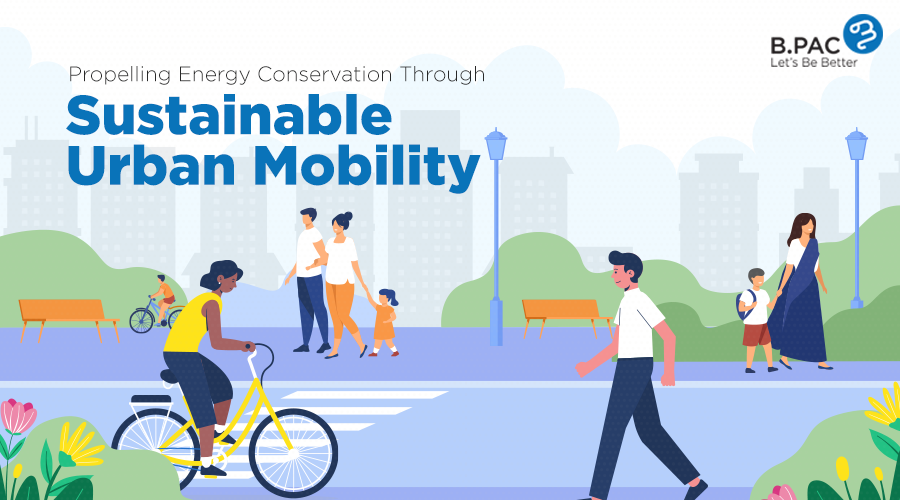Going Beyond Fossil Fuels
The global adoption of EVs (electric vehicles) is gathering momentum quickly. Rising fuel costs, the push for greener initiatives, changing consumer interests, and national regulations and policies have all contributed to the exponential rise of electric vehicles in Bangalore. It has also led many businesses to embrace EVs for their fleets. Known for their high fuel efficiency, EVs are potentially an affordable alternative.
The electrification of different forms of road transport has led to the presence of approximately 20 million passenger electric vehicles on the road today, according to a BloombergNEF analysis. Over 280 million electric motorbikes, scooters, mopeds, and three-wheelers are operational worldwide.
Data from the International Energy Agency (2020) and the Ministry of Environment, Forest and Climate Change (2018) indicate that, within the transportation sector, road transport is largely responsible for more than 90% of CO2 emissions. The Indian government has implemented a number of initiatives to electrify the transportation industry, for example, the National Electric Mobility Mission Plan (NEMMP) [3] for 2020.
Bengaluru’s Exponential Vehicular Growth and Pollution Levels
With an increasing population and demand for mobility, Bengaluru’s car population and emissions are escalating simultaneously. It increased dramatically over the past ten years from 50.33 lakh (2011–12) to 1.04 crore (till March 2022). Based on research done by the Center for Study of Science, Technology and Policy (CSTEP) on emission inventory, the city’s transportation sector is the largest contributor (2019) to Bengaluru’s fine particulate matter (PM2.5) emissions (40 – 51%). The pollution levels in Bengaluru would nearly triple by 2031 if the city continues on its current course (business as usual).
With the introduction of the Karnataka Electric Vehicles and Energy Storage Policy (KEVESP) in 2017, Karnataka became the first state in the country to have its own EV Policy. It envisions creating a conducive environment for EV transition while augmenting R&D opportunity in E-mobility. The goal of the Policy is to designate Bengaluru as India’s EV capital. The city has the most two-wheeler registrations in the nation and offers a favourable ecosystem for EV manufacturing, research and development, and technological developments.
Target
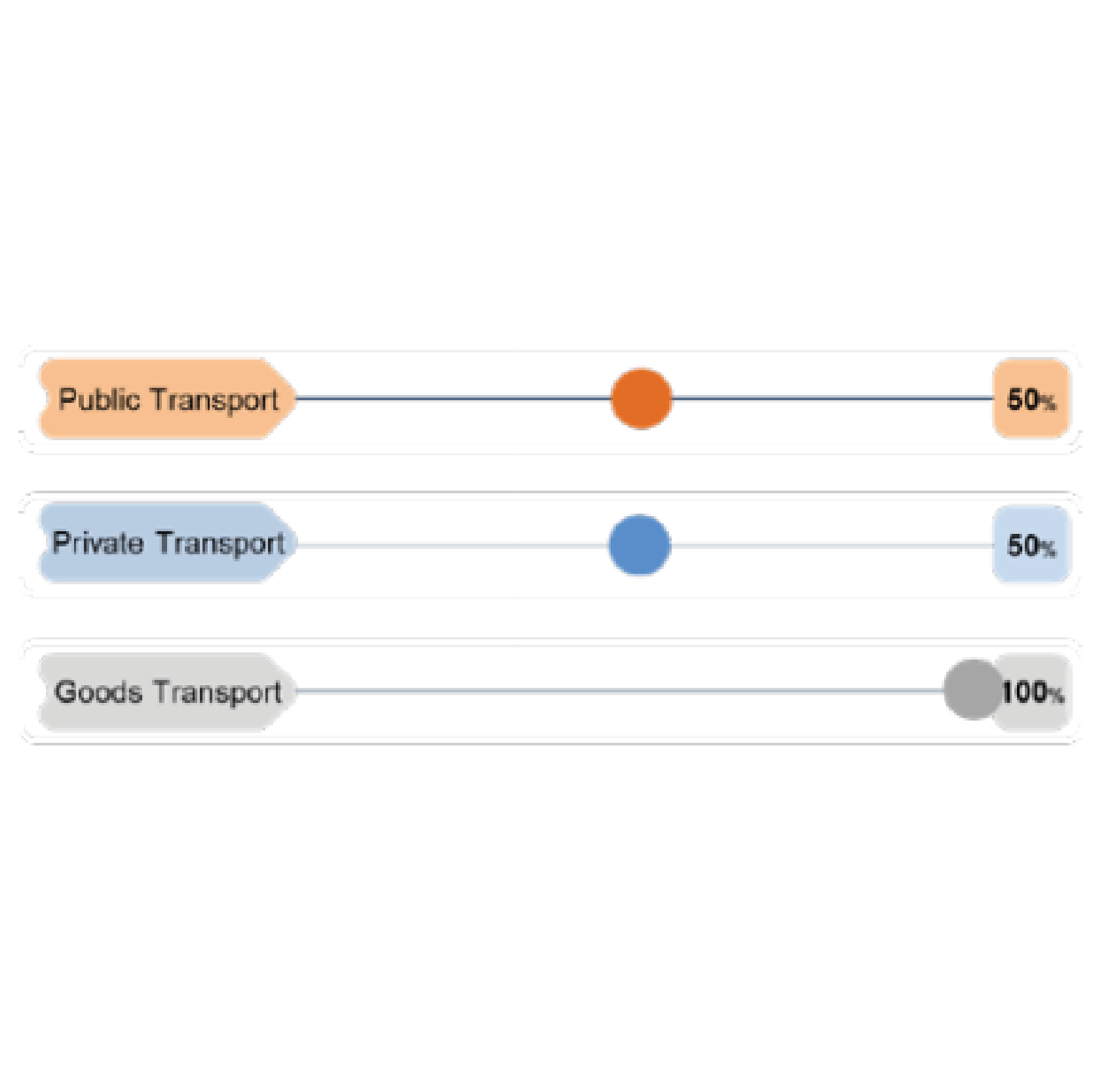
Source: Karnataka EV Policy
Karnataka has targeted public transport, private transport, goods transport, manufacturing and charging infrastructure sectors for achieving the 2030 vision.
According to KEVESP 2017, the Karnataka government wants Bengaluru’s private transportation sector to be 100% electric by 2030 [7]. 1,500 EV buses will be gradually added to the fleet of the Bengaluru Metropolitan Transport Corporation (BMTC) over the course of the next three years in an effort to promote EVs in the public transportation sector.
Karnataka EV Initiatives
The government of Karnataka has taken several steps to support the adoption and benefits of electric vehicles [Kyw] (EVs) in the state. These include providing subsidies on the purchase of EVs, setting up charging infrastructure, and offering special benefits for fleet operators who switch to EVs. The government has also announced plans to establish a manufacturing facility for EVs in the state, with the goal of making Karnataka a hub for EV production in India. Additionally, the state has been encouraging the use of EVs in public transportation by procuring electric buses and promoting the use of e-rickshaws. These efforts aim to reduce the state’s dependence on fossil fuels and promote sustainable transportation.
Let’s take a closer look.
Infrastructural initiatives by Karnataka government:
-
- Installation of the first batch of 100 fast charging stations under Karnataka Electrics Vehicle and Energy Storage Policy 2017..
- FAME I & II has sanctioned 94 and 72 EV charging stations
- Investment Target Rs. 31,000 Cr
- 15% capital subsidies to EV assembly and manufacturers on the value of fixed assets (Maximum land coverage 50 acres)
-
- Production linked subsidy of 1% on turnover
- FAME Phase I and II Ministry of Heavy Industries have sanctioned 65 and 172 EV charging stations and 14 and 30 charging stations for Bengaluru-Mysore and Bengaluru-Chennai Express Highways respectively.
Government programmes in Karnataka prioritise Consumer:
- 100% Road Tax exemption
- Venture Capital Fund in EV mobility
- All electric vehicles, including e-rickshaws and e-carts, are already exempted from GoK payment of taxes.
- ‘Sun Mobility Battery Swapping Network’ [8] launched in 2020 in Bengaluru.
- Encourages retrofitment in auto rickshaws s
- Exemption on stamp duty and electricity tariff
Government of Karnataka measures to raise awareness
- Launched ‘EV Jagruthi’, an awareness portal for electric vehicles that will help faster adoption and cleaner transport sector.
Current Status of EV Bengaluru
Bengaluru saw a gradual increase in the percentage of electric vehicle charger . among newly registered vehicles. Approximately 4,000 000 new vehicles are registered in Bengaluru each year. When it came to new registrations in Bengaluru before 2021, EVs made up roughly 0.8% of the total. With a goal of reaching 50% by 2030, this share climbed considerably in march 2021 to 2.3% and to 6.5% in march 2022.
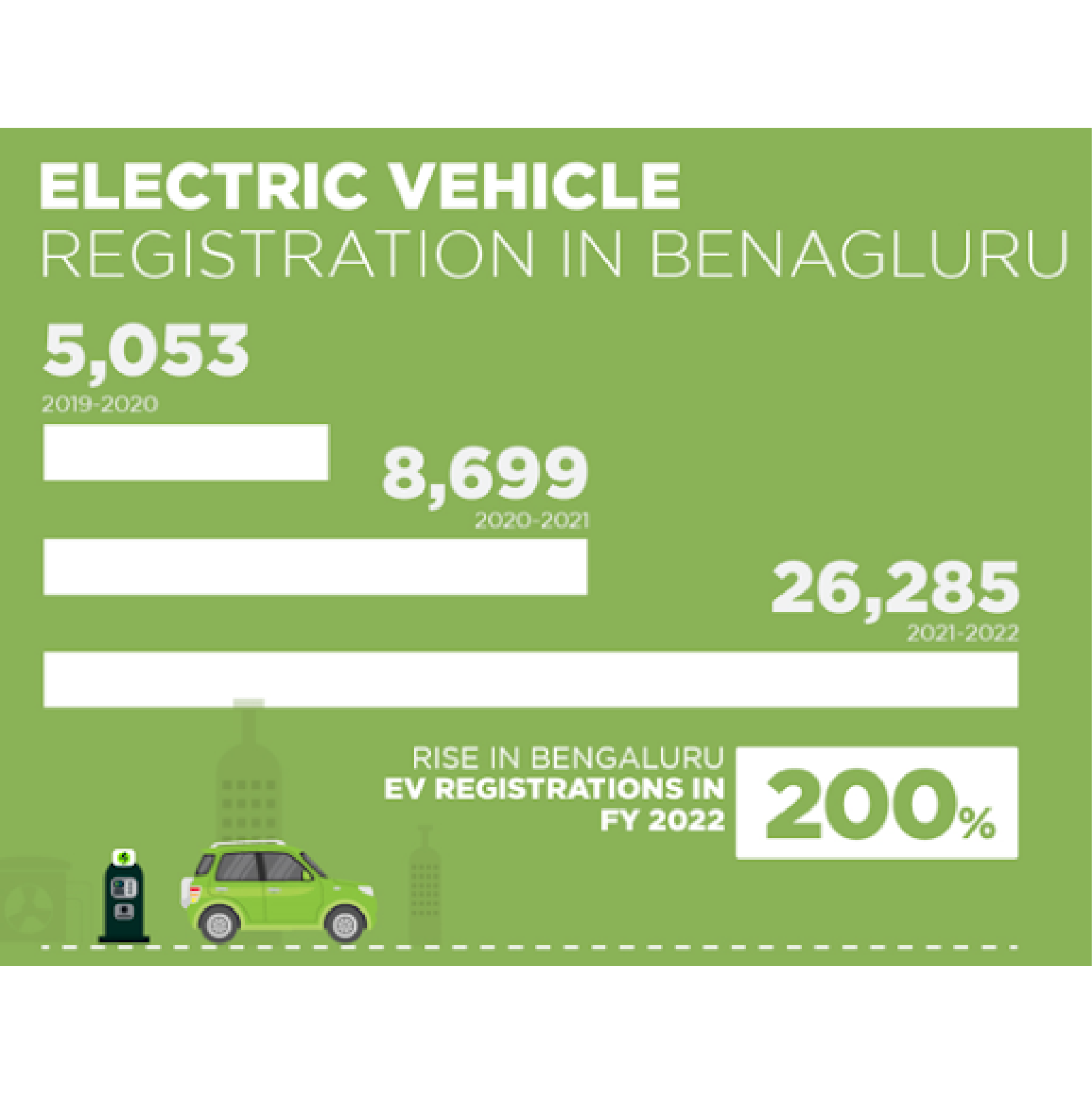
Number of EV registered in Bengaluru metropolitan area 2021-2022
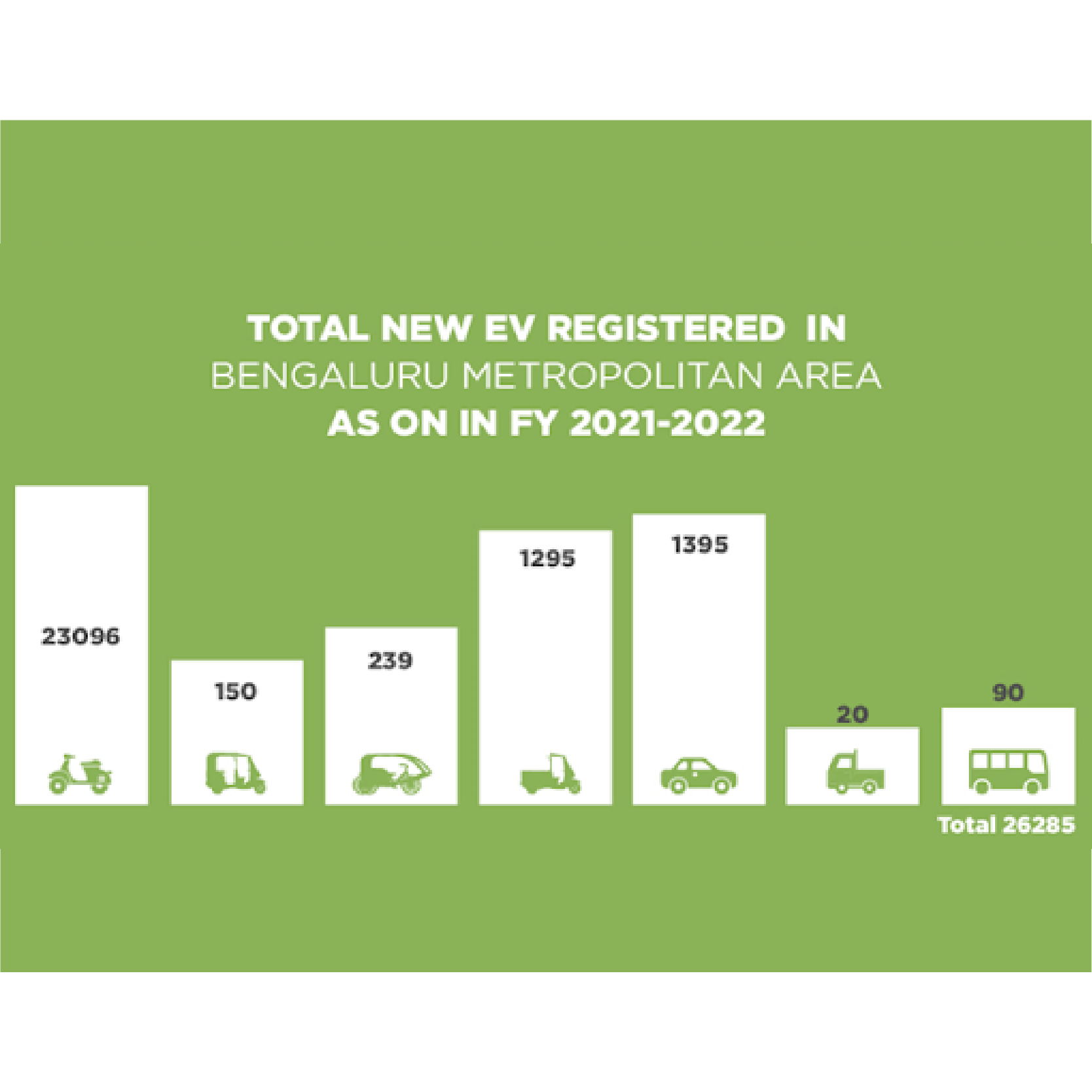
Source: Transport Department, Government of Karnataka
Of the 26,285 EVs registered in FY 2021-22 around 88% were two-wheelers and 5.3% were four-wheelers, 4.9% 3W Goods, only 0.9% e-rickshaw and 0.6% 3w Autorickshaw.
Key EV Mobility Initiatives in Bengaluru
| Initiative | Govt. Dept | Description |
|---|---|---|
| Electrification of public transport | BMTC | Launched Bengaluru’s first electric buses in Dec,2021
According to Bangalore Metropolitan Transport Corporation (BMTC), the 90 electric buses funded under the Bengaluru Smart City Scheme will function as feeder services, providing last-mile connectivity to the Bengaluru Metro. At present, 60 e-buses are operating from Kengari and Yeshwantpur depots. 30 e buses are likely to operate from KR Puram to Banashankari |
| Deployment of electric vehicle
charging stations |
BESCOM | have set up 136 EV charging stations — 106 AC and 30 DC chargers in Bengaluru
BESCOM has also provided a dedicated mobile app “EV MITRA” (both Android and iOS) for EV users to utilise the charging services. |
| Electric first- and last-mile connectivity | BMRCL | Metro ride (100% green, economical, min waiting time)
Currently, only in two metro stations |
Initiatives by other states/cities across India
Centre- Central planning authority, NITI Aayog intends that 80% of all two- and three-wheelers, 40% of buses and 30-70% of cars be EVs by 2030.
| State | Fiscal and Prospective Initiatives | Other Initiatives | |
| Delhi | Ambitious target of 25% electric vehicles among total vehicle registrations in Delhi by 2024
‘Aggregator policy’ (July 2022): -Mandates transition to an all-electric fleet for cab companies, food delivery firms and e-commerce entities by April 1, 2030 -Proposes a fine of ₹ 50,000 per vehicle if a company fails to make the transition. -All vehicles used by government officials will transition to electric vehicles by 2024. Charging Infrastructure -Total number of charging station 597 in 2021, FAME I & II has sanctioned 94 and 72 EV charging stations |
Launched chatbot on the instant-messaging platform WhatsApp in 2022.
Interest subvention of 5% on loans and/ or hire purchase scheme.
|
|
| 2W | Private Vehicles:
Subsidies: Rs. 5000/ kWh battery capacity. Max subsidy- Rs. 30,000 Road Tax exemption 100% Commercial Vehicles: 10% of all new two-wheelers they induct into their fleet are electric in the next 3 months. By March 2023, they will have to ensure that 50% of all new two-wheelers are electric. |
||
| 3W | Delhi Metro Issues 300 Permits To Electric Autos For Last-Mile Delivery.
50 electric autos start operation in the month of August 2022. |
||
| 4W | Private Vehicles
Ensure 25% of all new cars are electric. Subsidies: Rs. 10,000/ kWh Max subsidy- Rs. 1,50,000 Road Tax exemption 100% Commercial Vehicles: To ensure 25% of all new cars are electric by 2023. 5% of all new cars they induct into their fleet are electric. |
||
| Buses | The Delhi govt gave a big push by ‘e-buses only’ policy for all future procurements | ||
| State | Fiscal and Prospective Initiatives | Other Initiatives | |
| Uttar Pradesh | -10 Lakh EVs combined across all segment vehicles by 2024
Charging Infrastructure -100 DC public charging stations in 10 model cities -Fast charging, battery swapping infrastructure at every 50 kms on prominent highways -25% capital subsidy on equipment and machinery |
Land acquisition at concessional rates (25% reimbursement) to PSUs setting up charging infrastructure.
MSMEs/EVMUs/EBUs receives
Private EV Parks: developers of EV parks and clusters with plug and play facilities Financial assistance limited to 75% towards patents and certification
|
|
| 2W | Private Vehicles:
Subsidies: 2kWh : Rs. 10000/kWh (Dependent on Battery Capacity) Maximum ex-factory price 1.5Lakhs 100% exemption of road tax 100% exemption of registration fee Commercial Vehicles: (Dependent on Battery Capacity) 2kWh : Rs. 10000/kWh (Inclusive of e-commerce vehicles hired by Zomato, Amazon, Ola, Swiggy) |
||
| 3W | 100% exemption of registration fee. | ||
| 4W | Private Vehicles
Subsidies: –75% Road tax exemption for Four Wheelers –100% exemption of registration fee. |
||
| Buses | 1000 EV buses by 2030.
Public Transport: 35% of public transport will be converted to EV by 2022 [5]. 70% EV Public transport by 2030. |
||
| State | Fiscal and Prospective Initiatives | Other Initiatives | |
| Maharashtra | -All new govt. vehicles (owned/leased) operating within the major cities to be electric by 2030.
–5% of all new cars the government inducts into their fleet should be electric by 2024. Charging Infrastructure -One public charging station in a 3 km x 3 km grid or a minimum of 50 charging stations per million population. –1,500 charging stations in Mumbai itself by 2025. |
Encourage financial
institutions and banks to offer preferential interest rates for EV owners/buyers Highways/ expressways fully EV ready by 2025 i. Mumbai Nagpur Expressway ii. Mumbai Pune iii. Mumbai Nashik iv. Nashik Pune. Launched EV Cell in Mumbai to accelerate EV transition & adoption. Establishment of at least one Gigafactory (Reliance: Hydrogen fuel cell giga factory) Integration of agencies (MSRDC), (PwD)
|
|
| 2W | Private Vehicles:
Subsidies: –Rs. 5000/ kWh (Dependent on battery capacity) -Max subsidy- Rs. 25,000 –Road Tax exemption 100% –Scrappage incentive: Up to Rs. 7,000 |
||
| 3W | Number of vehicles: 15,000 (autos) + 10,000 (good carriers)
Subsidies: –Rs. 5000/kWh –Scrappage Incentive: Up to Rs.15000 |
||
| 4W | Private Vehicles
Subsides: Rs. 5,000/ kWh Max subsidy- Rs. 2,50,000 Road Tax exemption 100% –10% of newly registered vehicles in its major cities to be electric ones by 2025. –Exemption from toll charges and public parking lot charges. |
||
| Buses | -MSRTC to convert its existing bus fleet to 15% electric fleet by 2025.
–10% of vehicle cost subsidised. |
||
| State | Fiscal and Prospective Initiatives | Other Initiatives | |
| Gujarat | -Total outlay of Rs 870 crore offered as subsidy/incentive for new buyers of EV and investors into R&D of EV infrastructure [1]
Charging Infrastructure: –First 250 commercial public EV charging stations eligible for 25 % capital subsidy on equipment/machinery. –25% of all governments procured 4W vehicles to be electric by 2025. |
All housing and commercial establishments issue ‘No Objection Certificate’ (NOC) to installation of charging stations within designated parking spaces. | |
| 2W | Private Vehicles:
Subsidies: -Highest Subsidy issued dependent on battery capacity. -Rs. 10,000/kWh Rs. 1.5 Lakhs (Max ex-factory price to avail incentive) –Registration fee for buyers of electric vehicles waived off. -50% Road tax exemption |
||
| 3W | Subsides:
Rs. 10,000/ kWh (through Direct Benefit Transfer scheme) |
||
| 4W | Private Vehicles
Subsidies: –Rs.15 Lakh (15kWh) -Registration fee for buyers of electric vehicles waived off. -50% Road tax exemption –Road Tax exemption 100% |
||
| Buses | GSRTC procured;
180 public EV buses from JBM in 2021 50 public EV buses from Olectra in 2021 |
||
Charging Infrastructure
| Cities | Operational Charging Infrastructure | Planned
Charging Infrastructure |
| Bengaluru | 136 | 140 EV chargers during the course of next six month
1190 stations under PPP model |
| Mumbai | 100 | TATA to set up 1,500 stations. |
| Delhi | 597 | 18,000 public and semi-public EV charging points and battery swapping stations by 2024. |
| Surat | 441 | ChargeZone and Surat Municipal Corporation partnered to install 25 charging stations by October 2022. |
| Hyderabad | 150 | GHMC plans on installing 330 public EV stations by 2022. |
Innovative Communication Strategy:
| Cities | Awareness Initiatives |
| Bengaluru | ‘EV Jagruti’ was created for awareness about electric mobility in Karnataka and aims to serve as a ‘one-stop site’ to provide all the information related to the adoption of electric vehicles in the state.
‘EV-ABHIYAAN’ To promote adoption of E-Mobility in Karnataka, GoK is organising an Electric Vehicle Expo-Cum-Awareness campaign |
| Mumbai | Launched EV Cell in Mumbai to accelerate EV transition & adoption [4]. Cell carries information regarding managing E-waste (in accordance to ‘State Scrapping Policy’) technical assistance collaboration with the World Resource Institute (WRI) India |
| Delhi | #IRideEbus Campaign: Delhi Government has urged its citizens to ride its e-buses, take a selfie, and post it with the hashtag #IrideEbus on their Instagram, Twitter and Facebook handles. The top 3 entries will have a chance to win an iPad.
Launched chatbot on the instant-messaging platform WhatsApp in 2022. Launch of the Deliver Electric Delhi Report by DDCD. launched the ‘MY EV Portal’ to provide 5% Interest Subvention on purchase of electric auto rickshaws (e-autos) on loans. |
| Chennai (TN) | Redesign the curriculum for engineering colleges, ITI and polytechnics to incorporate courses that suit the EV industry. The draft also proposes to create a steering committee for EV and charging infrastructure. |
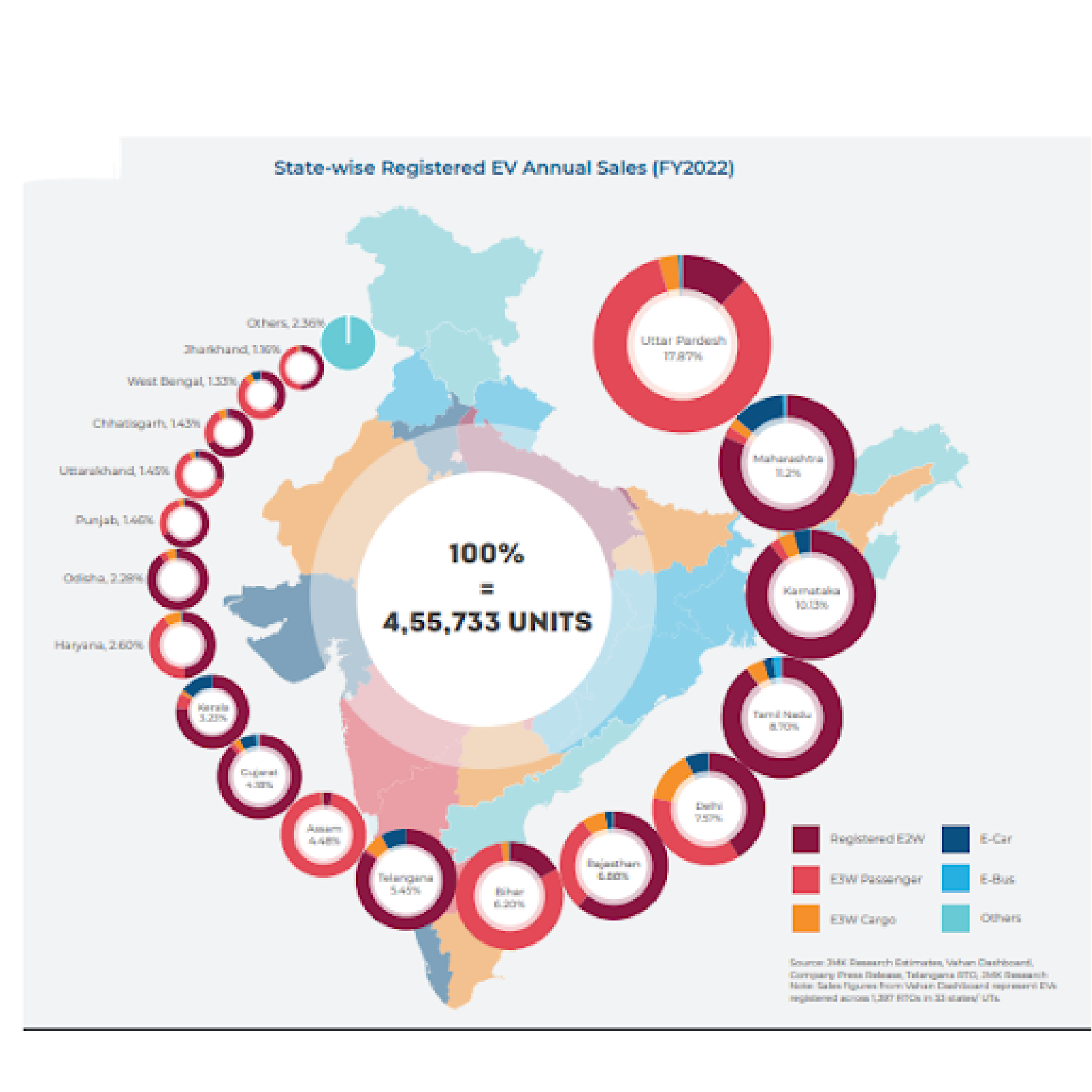
Source: JMK Research Estimates, Vahan Dashboard
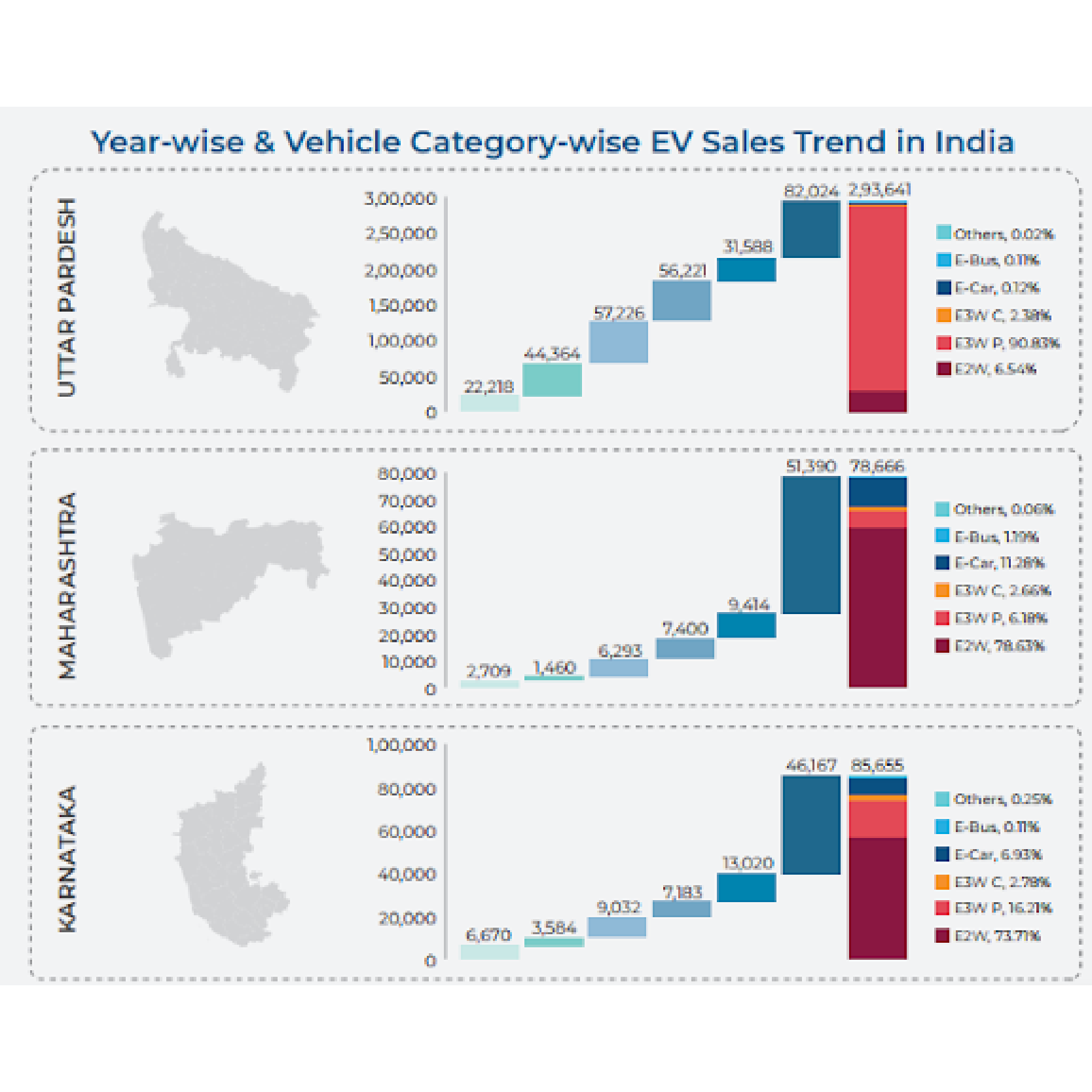
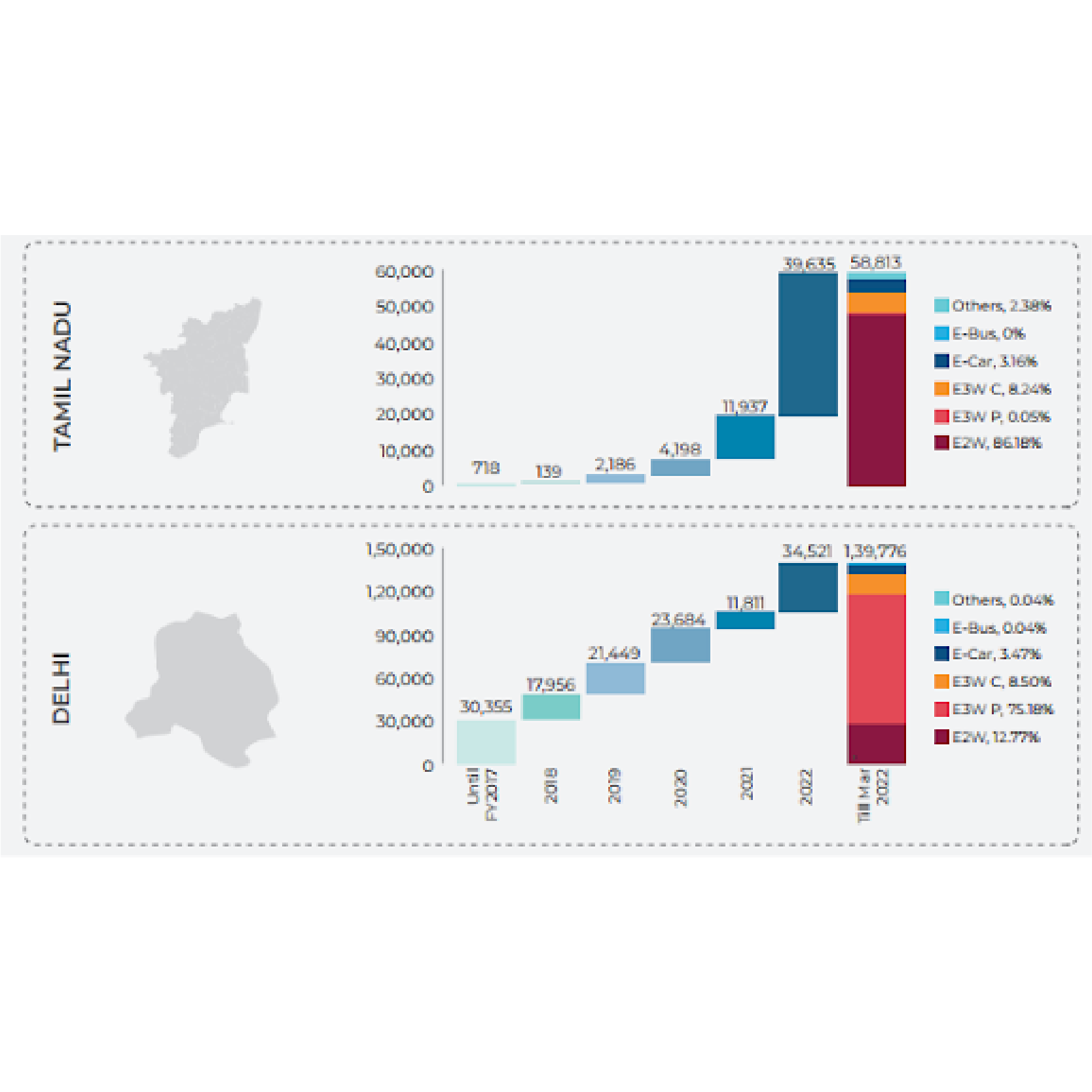
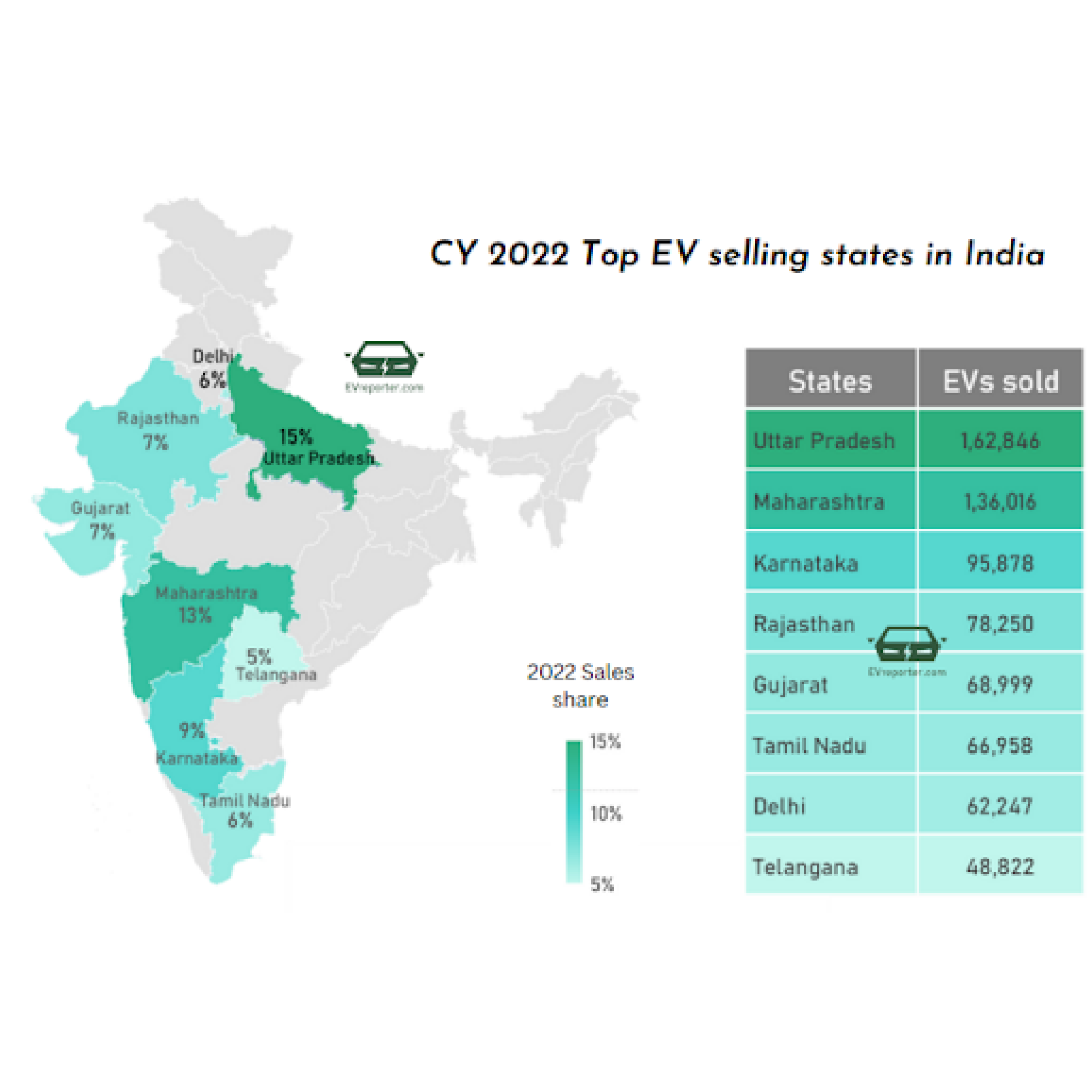
CY 2022 – Segment-wise sales in Top EV states in India
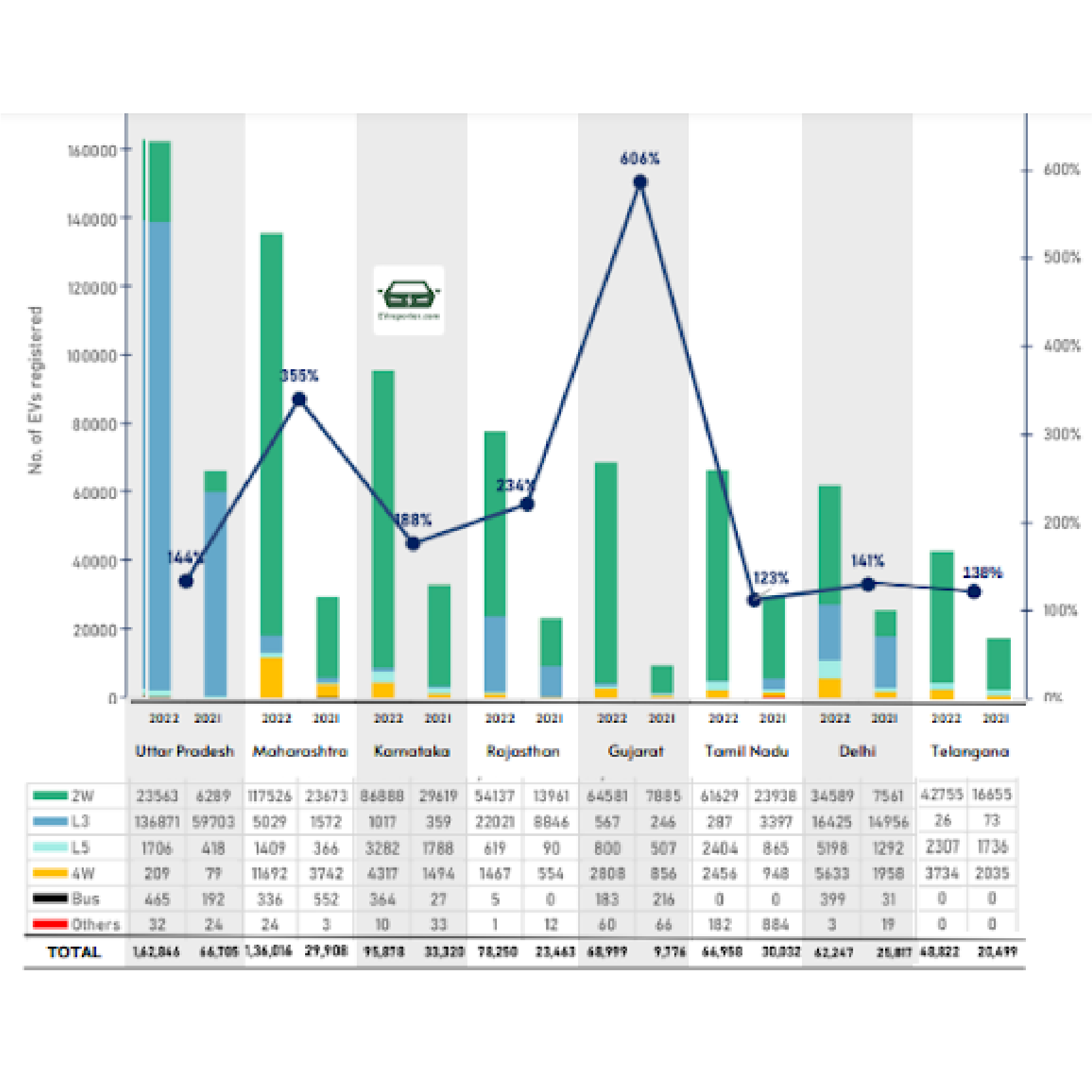
Source: Vahan Dashboard Data (Jan-Dec 2022) as per 1341 out of 1428 RTOs across 34 out of 36 state/UTs and Telangana Regional Transport portal (Jan-Oct 2022). Low speed e2W data not included.
Gaps and challenges:
- Birds-eye focus on capital subsidies and not only on consumer purchase incentive
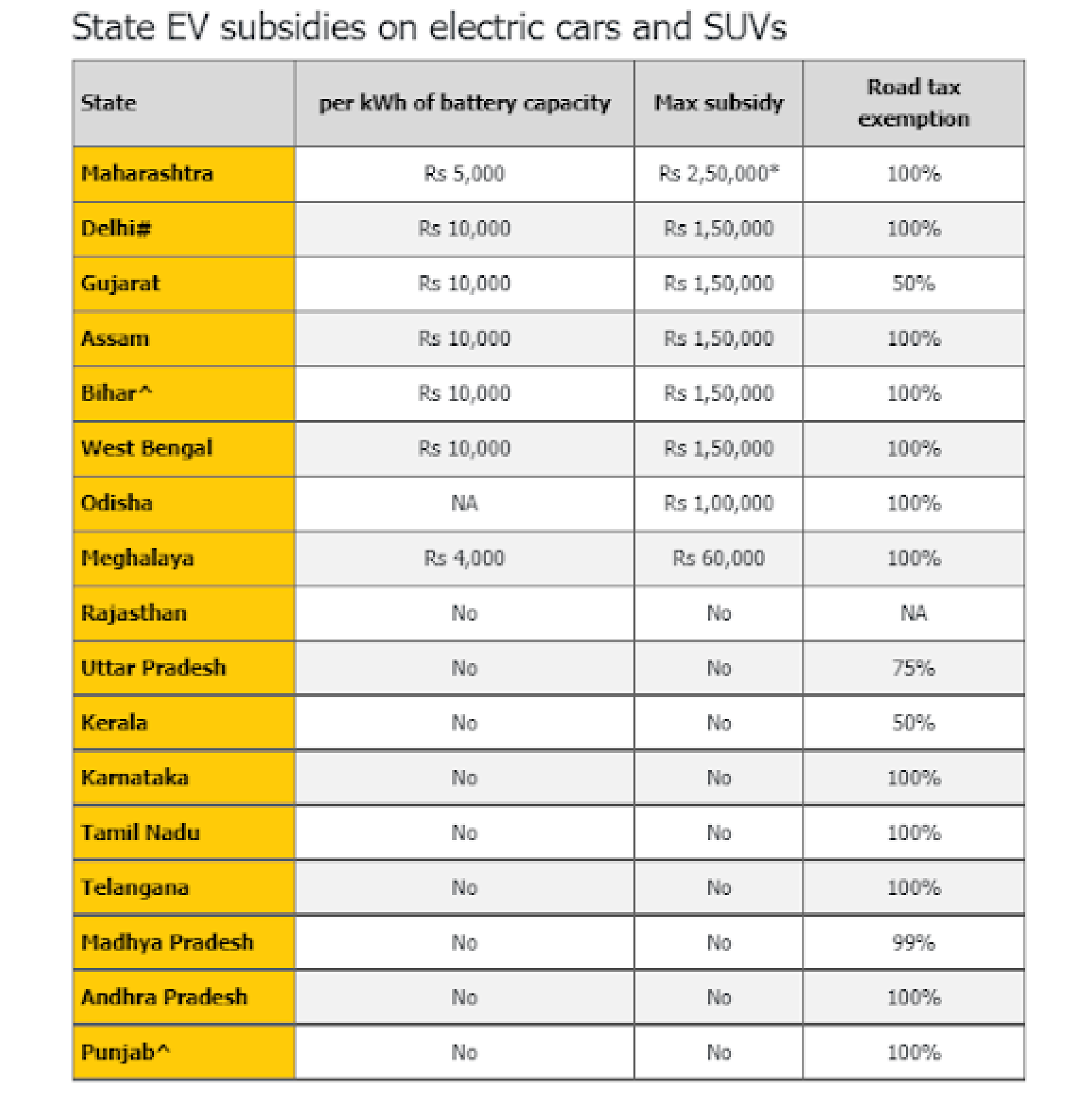
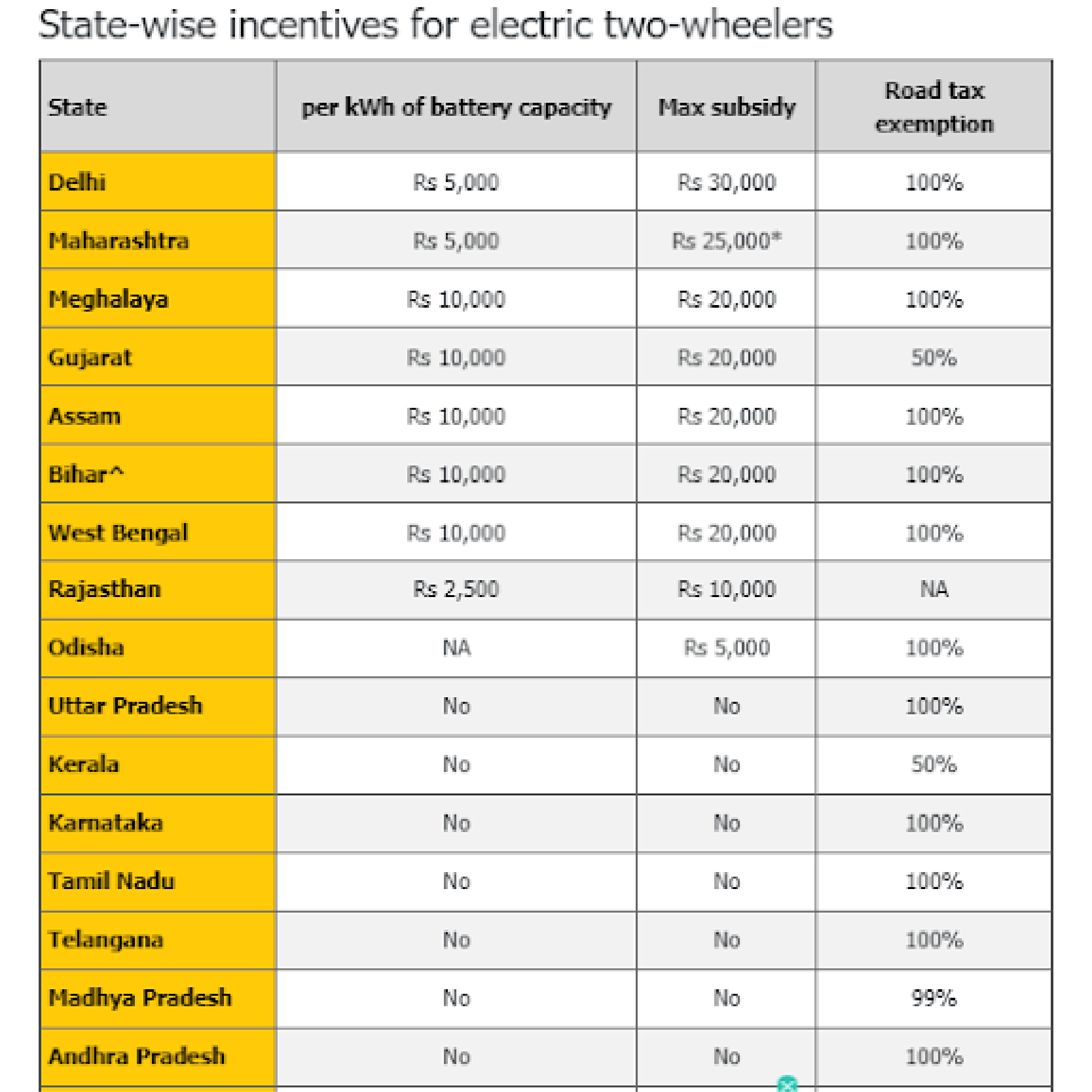
- To set up Electrification Targets for Bengaluru City (short, mid and long term targets)
- Setting up Bengaluru EV Dashboard
- Exemption from toll charges and public parking lot charges
-
- Promotion of electric first- and last-mile connectivity and delivery services
- Requiring fleet aggregators (i.e., e-commerce companies, last-mile delivery/ logistics players, and mobility aggregators) to convert at least 15% of their total fleet to EVs by 2023 and 50% by 2025
- Promotion of electric first- and last-mile connectivity and delivery services
- More incentives/subsidies to 3-wheelers
-
- Achieving 50% electrification in first- and last-mile connectivity to metro stations by 2025
- Procuring at least 650 e-buses in Pune by 2023 and 1,000 e-buses by 2025
- Creation of low-emission zones
- Electrifying all new government vehicles in Bengaluru
- Making at least 50% of city government office parking spaces EV ready by 2023
- Integrating electric mobility planning into the city’s Development Plan
- Providing property tax rebates to residential owners who install their own private charging stations
Key Takeaway
Electric vehicles are a key solution to addressing the challenges of air pollution, climate change and dependence on fossil fuels. The Government of Karnataka and the city of Bengaluru have taken commendable steps to promote the adoption of electric vehicles. The subsidies provided on the purchase of EVs, the establishment of electric vehicle charge station . infrastructure, and the offering of special benefits to fleet operators who switch to EVs are noteworthy initiatives that are helping with increasing the number of EVs on the roads.
Furthermore, the government’s plan to establish a manufacturing facility for EVs in the state, as well as the encouragement of the use of EVs in public transportation, indicates a commitment to sustainable transportation and a greener future. It is imperative that other states and cities across India take similar actions to support the adoption of EVs, in order to mitigate the detrimental effects of air pollution, curb the impact on climate change, and create a sustainable world.
References
https://pnt.gujarat.gov.in/Downloads/2021-06-23-GR-GujaratE-VehiclePolicy-2021.pdf
https://www.orfonline.org/expert-speak/maharshatras-electric-vehicle-policy/
https://qz.com/india/1943725/with-tesla-mahindra-ola-karnataka-is-leading-indias-ev-goals/
file:///Users/neharamesh/Downloads/EV%20Policy_Implementation%20Ask%20%20(1).pdf
https://jmkresearch.com/wp-content/uploads/2022/05/Annual-India-EV-Report-Card-FY2022-2.pdf




